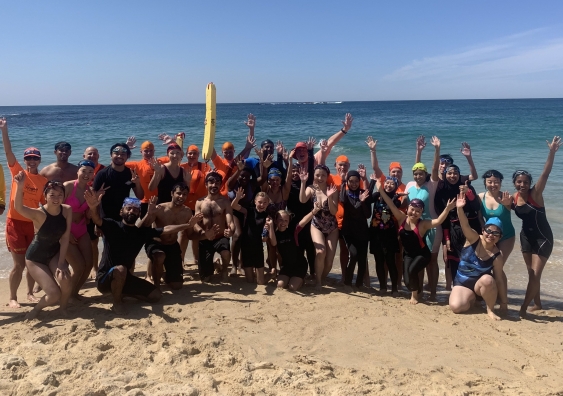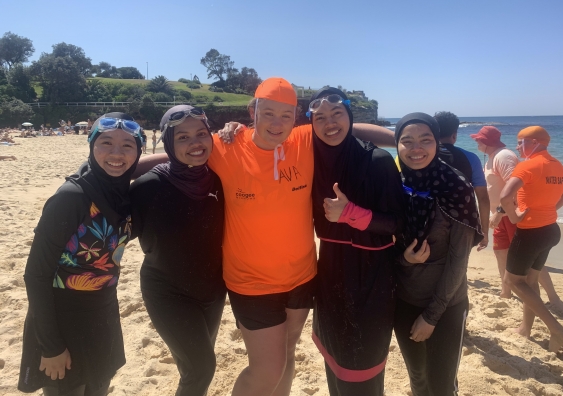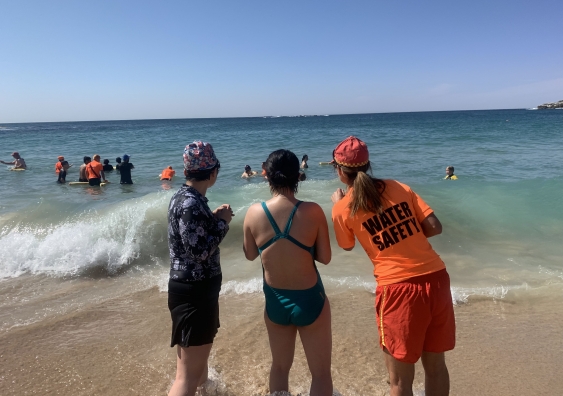International students swimming with the tide at UNSW
A learn to swim program is creating communities and building water safety awareness for international students.
A learn to swim program is creating communities and building water safety awareness for international students.

Megan Maurice
UNSW News & Content
0414376510
megan.maurice1@unsw.edu.au
Learning to swim is a rite of passage for most Australian children, but for those who grow up in countries with less access to water, swimming is a skill that often falls by the wayside.
For international students arriving at UNSW, this can present a dangerous problem – with Sydney’s eastern suburbs beaches right on their doorstep and a desire to understand this aspect of Australian culture, a lack of swimming ability can be deadly.
According to Royal Life Saving Australia, on average three international students die by drowning each year in Australia.
Recognising this gap between ability and desire, the UNSW Health Promotion Unit, in partnership with the YMCA and Coogee Surf Life Saving Club, created a program to teach vital swimming and beach safety skills to UNSW’s international student community.
The program runs for eight weeks and takes place each term. Students pay $50 to participate and a sponsorship from Medibank covers the additional costs.
There is a weekly one-hour lesson run by the YMCA’s qualified swimming instructors at the UNSW Fitness and Aquatic Centre and students are able to access the pool to practice their skills at any time during the eight-week period.

Members of the Coogee Surf Lifesaving Club assist with teaching the international students important beach safety skills
The final piece of the puzzle is a beach safety workshop conducted by Coogee Surf Lifesaving Club at the beach, which focuses on swimming between the flags, entering and exiting the water safely and how to dive under a wave.
Since its commencement in March 2018, 482 students have participated in the program.
One of the earliest participants, Muhammed Ourang is now aiming to complete his bronze medallion at Coogee Surf Life Saving Club and is an avid proponent of the program, particularly the beach safety element.
“All international students should take this lesson…especially for those who are unable to swim,” he said.
“It’s fun and important.”
A key element of the program has been the integration of mentors who have completed the program previously to guide and support students as they undertake the experience.
Each cohort of students joins a WhatsApp group to form a community around the program and receive advice from other group members and their student mentor.
“The mentors have been really helpful in trying to talk (the students) through their fears,” said UNSW’s Swim School Coordinator Simon Mullard.
“I think this program stimulates a sense of community. Because of the experiences that they’re going through as they learn together, and as they struggle through some of the difficult drills together, they tend to form those close relationships.”
With the program currently underway for 2020, recently analysed data from 2019 paints a fascinating picture of the effectiveness of the program.
Of the 153 participants completing pre and post program surveys, 20% felt very scared or anxious about the water prior to starting the program, while only 1% were very confident.
After completing the eight-week program, 17% now feel very confident, with a further 46% reporting feeling confident in the water and only 3% of attendees still feeling scared or anxious.

A surf lifesaver shows the students how to safely enter and exit the water
Former participant and mentor Niketa Patel believes the experience for international students is invaluable.
“Just getting in the pool I was nervous…but it was the best time I ever had,” she said.
“After the program I can just go into the pool and I can even stay afloat when the pool is deeper. That feeling of just lying down in the pool was amazing. I can’t express it, but those moments were very special for me.”